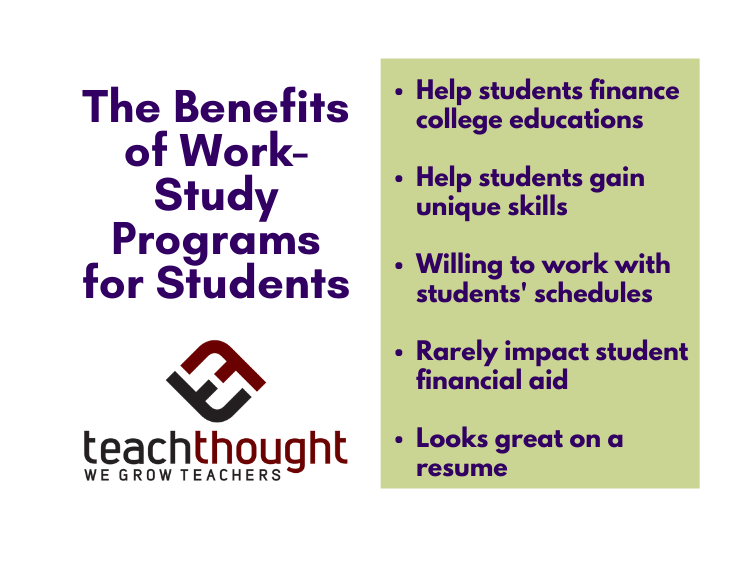
What Are The Benefits Of Work-Study Programs For Students?
contributed by Jessica Holmes
What’s a work-study program?
In short, a work-study program is a type of financial aid awarded to students in exchange for ‘work’ either on or off-campus. While work-study programs can be considered simply an on-campus job, they’re really an exciting time where students can grow skills in a related field and gain invaluable experience while cutting costs.
So what are the real benefits of a work-study program?
Work-Study programs can help students finance college educations.
While a work-study program won’t pay the entire tuition bill, it is part of the financial aid package awarded to the student. According to Crediful, “When you submit your FAFSA form and hear back on what awards you are eligible for, you may see ‘work-study’ on the list. Typically, these jobs are located on campus and should apply to your major. It’s an easy way to earn extra money towards your college expenses.”
These on-campus jobs can help provide money for books, food and a social life (we all have to have one of those). Obviously, the fewer loans you need to take out, the better.
Students can gain unique skills difficult to gain elsewhere.
The skills students can pick up through a work-study program can directly impact their success later in life. Not only can they secure work that relates to their major but they can also gain skills that may take years to cultivate in a shorter amount of time. While one could certainly work off-campus in non-work study employment, there are advantages to staying on or near campus, working and networking within the university ‘structure’ learning different skills in the bursar’s office or offering guided tours.
The skills learned can also be more in-demand. It is important that one cultivates the skills in those on-campus jobs, especially when working in a place like financial aid or giving a tour. Job performance impacts a student directly. The experience these programs provide could negatively or positively impact how they feel toward the university, making the job a little more high-pressure. In short, the more plugged-in to a university a student feels, the more aware of all university resources they can be and the more confident they have the chance to become as a growing professional.
The pressure to perform well in jobs that closely mimic ‘real world’ positions can also serve students well later in life as they prepare for a career.
Work-Study programs can be more willing to work with student’s schedules.
The best part of working at an on-campus job is the willingness to work with student schedules. Chances are that students won’t be working until 2 AM like they could if they worked in a restaurant or bar. They also won’t have to explain to a boss that finals are coming up and that they need time to study. Bosses at work-study programs are more likely to understand that finals are a tough time and be more willing to accommodate that schedule.
Work-Study programs rarely impact student financial aid.
Even better than helping to finance a student’s education? Work-study jobs should not impact student financial aid. While students still have to report work-study income, the calculation is a little different. Students actually put the information about work-study income in two different places. First, it goes in the space about total earned income since they will be taxed on income during your work-study program.
Then, there’s a second section that asks about work-study, assistantship and fellowship earned income. That income is not counted when calculating how much aid students are eligible for. While a part-time job off-campus counts when calculating how much aid students are eligible for, work-study won’t hurt the aid received. Along with more college-friendly schedules, this is one of the more significant benefits of a work-study program.
A quality work-study experience looks great on a resume.
Jobs look amazing on student resumes!
Having a job while in school shows future employers that students are more than capable of tackling multiple projects at once and can handle some pressure and prioritize outside of the classroom while still being successful inside of one. It also shows a willingness to get involved on campus. A willingness to get involved on-campus can imply that students may be willing to get involved at work and employers love that!
A work-study program can actually be more beneficial than an off-campus job. While students may not make the same amount of ‘cash’ as they could working off-campus, the long-term benefits of work-study are well worth it for many students. Students should consider clicking the box that says they are interested in a work-study job next time they fill out that FAFSA form. It never hurts to get more information even if they never accept the position!